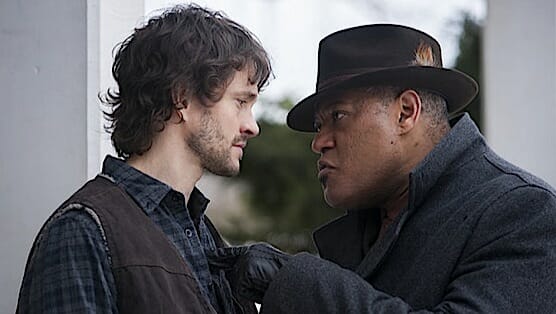Hannibal: “Yakimono”
(Episode 2.07)

Watching “Yakimono” has made me realize how little I’ve mentioned Raúl Esparza’s Dr. Frederick Chilton in my recaps. Certainly, Esparza deserves a fair share of ink. His Chilton, an effective mix of pompous intellectual and sniveling coward, has made for several excellent exchanges with both Will and Hannibal over this past season. What’s more, his blunt acknowledgment regarding his terror of Hannibal and the man’s potentially cannibalistic tendencies is a nice antidote in a show where characters tend to beat around the bush a lot. Moreover, despite the fact that Chilton is truly put through the ringer in this episode, he’s perhaps the only character that can do so while also adding an unmistakable sense of black humor to the proceedings.
It’s with great sadness then that we might be saying goodbye to the character (as well as Eddie Izzard’s Gideon)—another victim of Hannibal’s ever widening “grand design.” While I’m of the opinion that no TV character is dead until we see a body (which is why I suspected Miriam Lass would one day return), the exit wound caused by Miriam’s gunshot looks fairly severe. It also creates a major shift from the traditional Thomas Harris timeline, wherein Chilton is still alive at the time of Silence of the Lambs. Then again, the Beverly Katz character is also alive in that timeline, so this could very well be Bryan Fuller’s ultimate statement that he and his writers do not treat the source material as scripture never to be seriously deviated from.
Much of what precedes Chilton’s “demise” concerns the unexpected return of Miriam Lass, the eager-to-please FBI agent whose determination to please Jack and solve the Chesapeake Ripper case ended with her being abducted by Hannibal Lecter. Hannibal proceeded to throw her into a hole yet continued to keep her alive, even after he amputated her arm.
All of this means that we are given a fantastic showcase of guest star Anna Chlumsky. I feel as though Hannibal’s talent when it comes to casting well known actors only to subvert their traditional image is a recurring tradition that deserves no shortage of praise. It’s a show that makes you believe in Cynthia Nixon as a hardened FBI supervisor or funnyman Eddie Izzard as chilling killer. Watching Chlumsky here perfectly embody the traumatized, psychologically scarred Miriam—all images of Amy Brookheimer from Veep are instantly wiped away. In some ways, Chlumsky must internalize Will’s entire arc from the first season into a single episode. We quickly learn that Hannibal hypnotized her much in the same way he did our protagonist, with epilepsy-inducing flashes and perception-altering hypnosis. Of course, the episode kicks off with Miriam claiming that Hannibal was not her abductor, so whatever he did to here over the course of the past few years runs deeper than anything involved in Will’s mental breakdown.
-

-

-

-

-

-

-

-

-

-

-

-

-

-

-

-

-

-

-

-

-

-

-

-

-

-

-

-

-

-

-

-

-

-

-

-

-

-

-

-








































